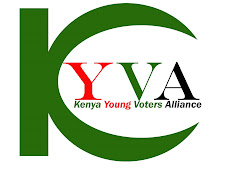KYVA is a conglomerate of organizations and individuals committed to ensuring that Kenya as a country manages to achieve set developmental goals to meet both the international and national targets. The idea was mooted by the (SONU) leadership of 2003/4. KYVA leadership is composed of diverse backgrounds and experiences. We urge all Kenyan youths to take charge of leadership at the counties and national levels. Register as voters and vote in large numbers for young visionary leaders.
Wednesday, March 24, 2010
TSC MUST STOP BOGs FROM TAMPERING WITH THE TEACHERS RECRUITMENT PROCESS.
In just about a fortnight, the Teachers Service Commission (TSC) is going to embark on the recruitment of teachers in both primary and post primary institutions in an attempt at addressing the huge shortfall in its workforce. As opposed to primary schools where the process is done centrally at the respective district education offices, such interviews are conducted in the respective institutions when it comes to post primary institutions. Here, the respective boards of governors (BOG`s) are tasked with the responsibility of interviewing interested applicants and recommending the most successful ones to be employed by TSC. And as is often the case, this exercise will be followed by much gnashing of teeth as a result of skewed recruitment procedures.
Although many BOG`s will show that the decision to settle on a given candidate was legitimate, the reality is that this exercise is always clenched in the rigor mortis of gender, nepotism, ethnicity and religiosity. Even though TSC has time and again allayed fears that the process is insulated from any tampering; in reality, if an institution’s governing body decides to rate gender, nepotism, ethnicity or religious devotion higher than pure professionalism when recommending a teacher to TSC for employment, then nothing in the current TSC interview guidelines can stop them.
To begin with, “unwanted” candidates will not be privy to the date scheduled for the interview despite having traveled hundreds of kilometers to submit the applications. And if they are lucky enough to attend such interviews they will normally be locked out on technicalities other than those stipulated by TSC. For instance, a board may deliberately tamper with the subject combinations or add something else that is totally strange to professionalism in order to favor their preferred candidate. Since unsuccessful applicants are unlikely to want to publicize the fact that they were discriminated against or launch a case in a court of law, this means that many applicants will have been discriminated against and will continue to be discriminated against with no legal protections.
Even if a teacher manages to get a job in such a school despite his or her gender, ethnicity or faith, their problems may not be over. School boards can, inter alia, decide to recommend to TSC on levels promotion on the basis of the ethnicity or faiths of teachers, meaning that there can be a de facto ban on senior posts for those from the wrong gender, ethnic or religious backgrounds. In such instances, rarely is performance considered as a factor in promotion.
Despite being aware of this anomaly, TSC has made no coherent or principled defense of this situation and it is therefore unsurprising that in most cases it endorses the decisions of the boards without as much as a query thus justifying the extent of discrimination allowed against teachers.
Eliminating malpractices in the teacher recruitment process is a simple solution that does not need high priced consultants or endless reinventions of the wheel. We already have in place the Ethnic Relations Act, therefore what remains is its enforcement that will put a stop to semi autonomous government agencies (SAGAs) such as TSC from continuing to operate in stark contrast with the expectations of the larger Kenyan populace.
The least we expect from the Government is for it to force TSC to ensure that school boards do not discriminate applicants based on gender, nepotism, ethnicity or religion in employment. In so doing, it will perhaps make teaching a profession that can draw enough qualified and competent applicants. After all, hiring the best teacher is the single most important school ingredient to a child's learning success.
TOME FRANCIS,
BUMULA.
http://twitter.com/tomefrancis
Subscribe to:
Post Comments (Atom)

No comments:
Post a Comment